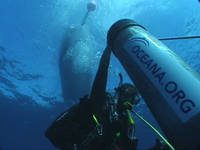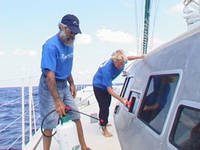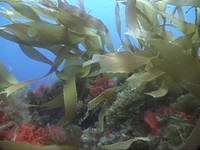June 14, 2005
Four dives. Tuesday, June 14th, 2005

This was another day spent in the middle of the ocean. Upon awakening on the Ranger, the sea was ever so still. After we spent the night adrift, we had only shifted 4 miles, which, in the opinion of the captain and sailors, is not too much.
Today, the diving team planned to do four dives. They have decided to dive in pairs and separately, in order to better control the situation. Mar was feeling discomfort in one ear, but she is better now. Everything seems to indicate this is going to be a very nice day.

Meanwhile, Bibi, also known as pangueira, because she operates the panga or auxiliary boat like a pro, has taken the divers to the place of diving. We had time for many other activities on the ship. For instance, we carried out all maintenance work at the Ranger. We cleaned the windows at the bridge, made brackets to fold the sprit sails, changed the compressor filters to recharge the diving tanks and prepared food. We also seized the opportunity to go for a swim in the sea. On the surface, we saw a big tunid and almaco jack fish that were with us along the way.
Indi, the cook at the Ranger, always finds time to observe marine birds. Since our arrival at the Gorringe Ridge, we have seen european storm-petrels ( Hydrobates pelagicus ), and one cory’s shearwater ( Calonectris diomedea ). The european storm-petrels are smaller size marine birds of, black in color, with a white spot on the tail rump. It feeds on crustaceans and plankton. They nest on rocky coasts and islands.

The captain has given me permission to go along with Bibi on the auxiliary boat. As we arrived at the anchor buoy, again we were surrounded by about fifty european storm-petrels. On the surface of the sea, there was garbage, and remains of Blue bottle or Portuguese man-of-war jelly fish, and some type of mollusks. Since this observation, Ricardo Aguilar, Project Manager at Oceana and Juan Pablo Camblor, Zoea Director, have been commenting on this peculiar phenomena, such as the large gathering of Blue bottle or Portuguese man-o during the Ranger campaign in the Azores, or the great congregation of jelly fish in the Mar Menor during the summer months. Ricardo explained that the ocean trophic chain is transforming and that when species at the top levels of the food chain decrease in numbers, invertebrates go through rapid reproductive cycles. Changes in temperature can also influence this process as well sewage water and water treatment substance discharges, etc.
The divers are back, they have gone down from the bottom to the top of Gettysburg. They told us that the surface of the mountain is not uniform, but full of fissures, nooks and irregularities, which provide for a wide variety of habitats for marine life. As for fish, they observed the same species as yesterday ( almaco jack, Mediterranean rainbow wrasse, etc ). They have also filmed a spotted torpedo and found an area with gorgonian ( corals ) of small sizes.
We listened to classicla music at the messroom and Nuño, the captain plays bagpipes on the prow. Meanwhile, we remember all those who have been on the Ranger and made this project possible.


